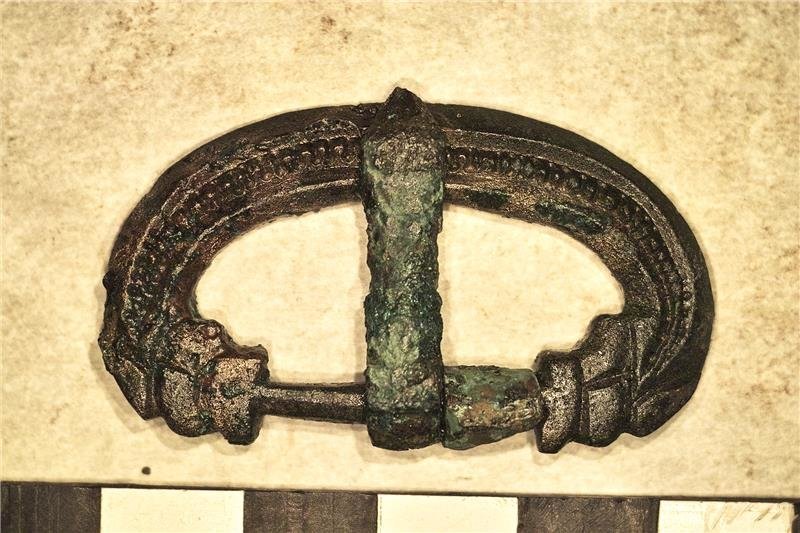MessageToEagle.com – A rare, ancient decorated belt belonging to a late Roman Official has been discovered at a cemetery in Leicester, UK.
While excavating the ancient cemetery archeologists unearthed 83 skeletons. One of them were the remains of a middle-aged man wearing an elaborately decorated belt in a style that would have been worn by a Late Roman soldier or civil servant during the second half of the 4th century or the early 5th century AD.
The simple grave had been dug into mudstone on the west bank of the River Soar, to the south-west of the Roman town close to the important road known as the Fosse Way.
The find, which is rare in Britain, was positioned at the waist of the skeleton and comprises a belt buckle, belt plate and strap end.

Credit: University of Leicester
“The survival of the delicate thin sheet bronze belt plate is remarkable. It is cast in the so-called ‘chip-carved’ style decorated with interlocking spirals and would have been riveted to a wide leather belt or girdle with a thinner securing strap running through the buckle and ending with the strap end,” Nick Cooper, Post-Excavation Manager at University of Leicester Archaeological Services (ULAS) said.
See also:
Defixiones: Ancient Roman Curse Tablets Became Big Business
Londinium: Ancient Roman Outpost That Became Powerful City Of London
Ancient Roman Government Structure And The Twelve Tables
Similar ancient belts have been discovered in other Late Roman cemeteries, for example in London, Dorchester on Thames and Winchester, and at the shore fort on the opposite side of the English Channel at Oudenburg in Belgium.
Such belts were worn across north-eastern France, Belgium, and along the eastern frontier of the Roman Empire, running along the Rivers Rhine and Danube, where soldiers were stationed. There is some contemporary pictorial evidence to suggest that this type, specifically, was worn by members of the Late Roman military and civilian elite and that the belts were important symbols of authority.
It it very likely the man who wore the decorated belt was man was either a member of the late Roman army or, perhaps following retirement, became an important local civil servant.
MessageToEagle.com






